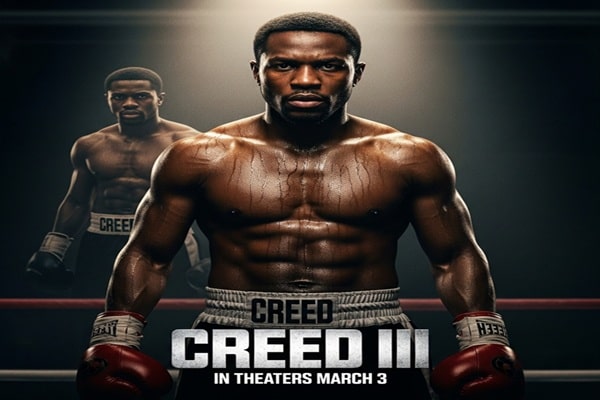Michael B. Jordan has always been a force to be reckoned with on screen, but with Creed III, he’s proven that his talents extend far beyond acting. Making his directorial debut while starring in the film, Jordan has not only broken records but also set a new standard for representation and creative ambition in Hollywood. Let’s explore why Creed III is more than just another sports film—it’s a milestone moment for the industry.
Michael B. Jordan: From Actor to Director
Actors stepping behind the camera is becoming more common, but it’s still a huge leap, especially when you’re taking on a major franchise like Creed.
-
Triple Threat: Jordan isn’t just acting; he’s producing and directing, showcasing versatility rarely seen at this level.
-
Unique Perspective: Having lived in the character’s shoes, Jordan brings insights to the storytelling process that an outside director might miss.
-
Representation Matters: His role as a Black director in Hollywood highlights the importance of diverse voices shaping mainstream cinema.
Breaking Records: A Historic Opening Weekend
Creed III didn’t just perform well—it made history.
-
Over $100 Million Globally: It became the first sports film ever to surpass $100 million in its opening weekend worldwide.
-
Critical and Commercial Success: Audiences and critics alike praised the film for its emotional depth, action sequences, and stunning visuals.
-
Proving the Market for Star-Directors: Jordan’s success demonstrates that audiences are eager to support projects helmed by actors who bring authenticity and passion to the director’s chair.
The Challenges of Directing for the First Time
Directing while acting is no small feat, and Jordan hasn’t shied away from discussing the hurdles.
-
Balancing Dual Roles: In interviews, he’s explained that juggling acting and directing requires intense focus and time management.
-
Impact on Future Projects: The time and energy directing demands can limit other acting opportunities, making each project a major commitment.
-
COVID-19 Adjustments: Pandemic restrictions forced the team to rethink filming schedules and safety protocols, adding layers of complexity to production.
Despite these challenges, Jordan credits his team’s dedication and adaptability for helping bring his vision to life.
Emotional Depth and Visual Storytelling
One of the most talked-about aspects of Creed III is how it combines action with real emotional resonance.
-
Character Development: Jordan’s intimate understanding of Adonis Creed allows him to explore nuanced relationships, personal struggles, and growth arcs more deeply than previous installments.
-
Visual Style: From fight choreography to cinematography, the film’s visuals elevate the story, making every punch and moment of triumph feel cinematic and powerful.
-
Critically Acclaimed: Reviews consistently highlight the emotional impact, noting that Jordan’s directorial choices bring authenticity to the film’s core themes of family, ambition, and resilience.
Representation in Hollywood: Why It Matters
Jordan’s work behind the camera is more than a personal achievement—it’s a statement for the industry.
-
Diverse Voices: Representation in directing roles influences which stories are told and how audiences see themselves reflected on screen.
-
Inspiration for Future Filmmakers: Aspiring directors from underrepresented communities now have a tangible example of what’s possible.
-
Breaking Barriers: Jordan joins a growing number of actors who are proving that talent can transcend the screen, challenging traditional notions of who gets to tell big stories in Hollywood.
Also Read : FORMER NBA STAR SHARING HIS COLOURFUL “BARBERSHOP” THROUGH NFTS
Lessons from Michael B. Jordan’s Journey
There’s plenty to learn from Jordan’s approach to taking risks and stepping into a new creative role:
-
Take the Leap: Don’t wait for a perfect moment—sometimes the best growth comes from diving into new challenges.
-
Lean on Your Team: Success isn’t solo; Jordan emphasizes collaboration and trusting the people around you.
-
Balance Passion with Practicality: While acting remains important, dedicating time to direct allowed him to tell the story exactly as he envisioned it.
-
Embrace Obstacles: COVID-19 and logistical challenges tested the team, but adaptability turned obstacles into creative solutions.
Looking Ahead: What This Means for Hollywood
Creed III is more than a blockbuster—it’s a signal that Hollywood is evolving:
-
Actors as Directors: More performers may step into the director’s chair, bringing fresh perspectives to familiar stories.
-
Expanded Storytelling: Audiences can expect richer, more personal narratives from franchises traditionally driven by action alone.
-
Representation Wins: Jordan’s success emphasizes that audiences reward films with authentic voices, encouraging studios to take risks on diverse filmmakers.
Final Thoughts
Michael B. Jordan’s Creed III isn’t just a sports film—it’s a milestone in cinematic storytelling. By directing and acting in the same film, he’s shown that creativity knows no bounds when combined with dedication and vision.
For fans of Creed, it’s a thrilling continuation of a beloved story. For Hollywood, it’s a blueprint for how actors can successfully expand their influence behind the camera. And for aspiring filmmakers everywhere, it’s proof that courage, hard work, and authenticity can change the game.




